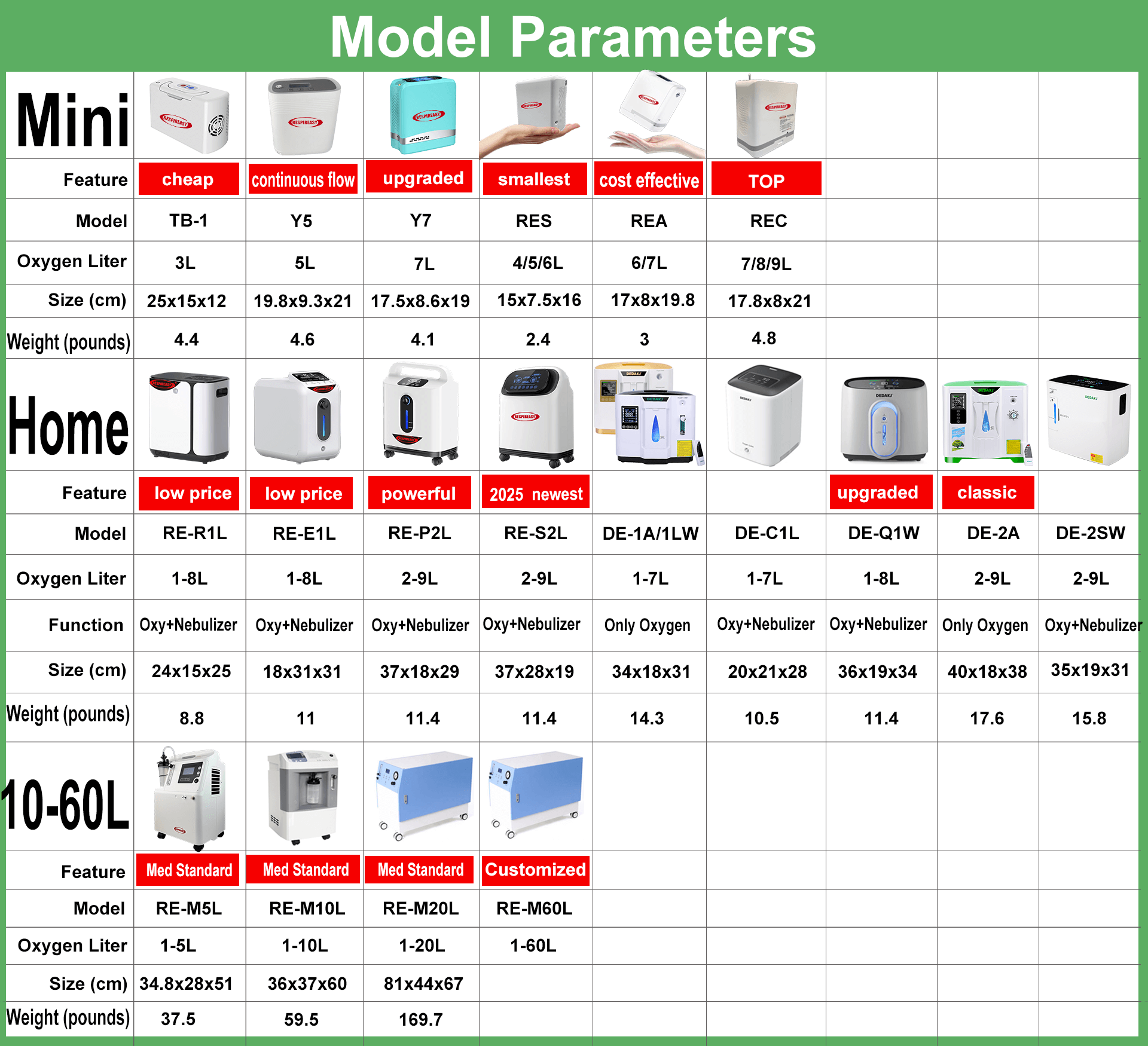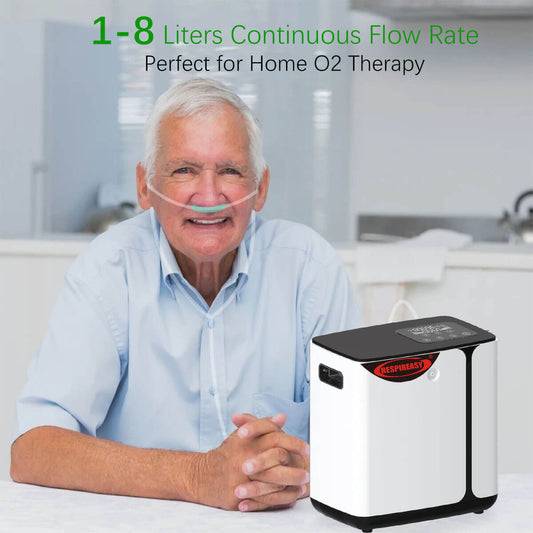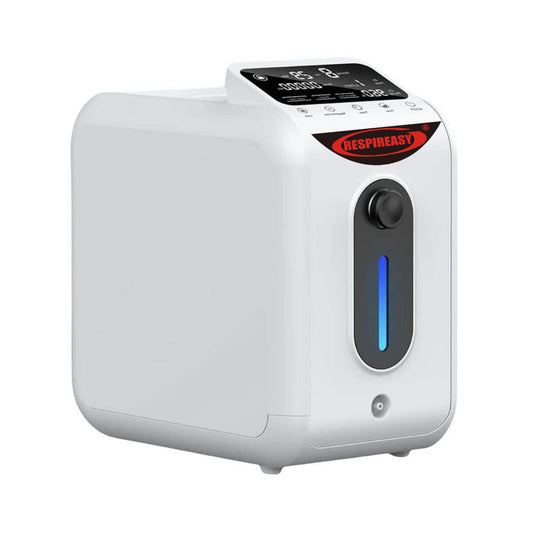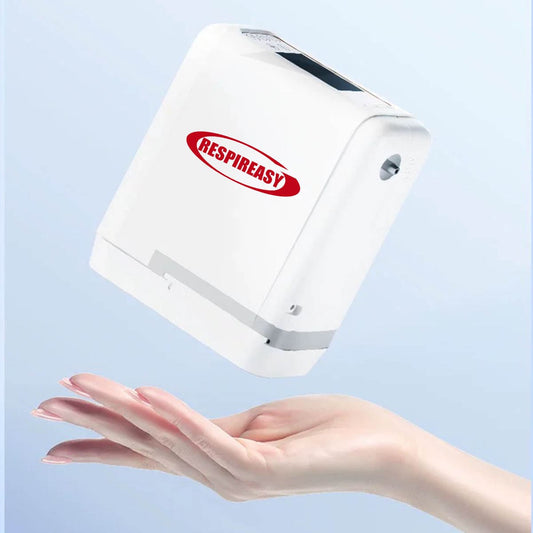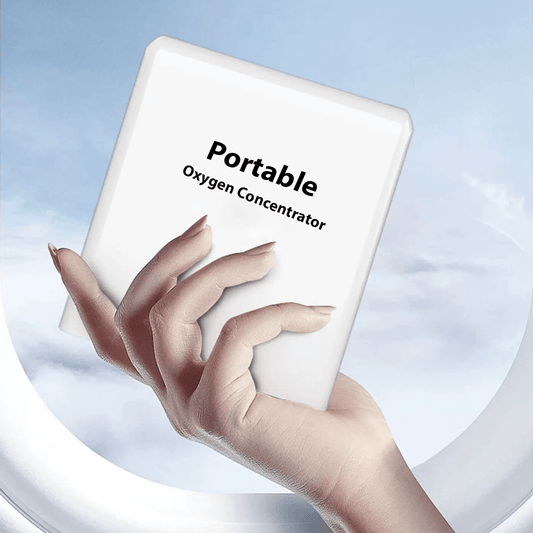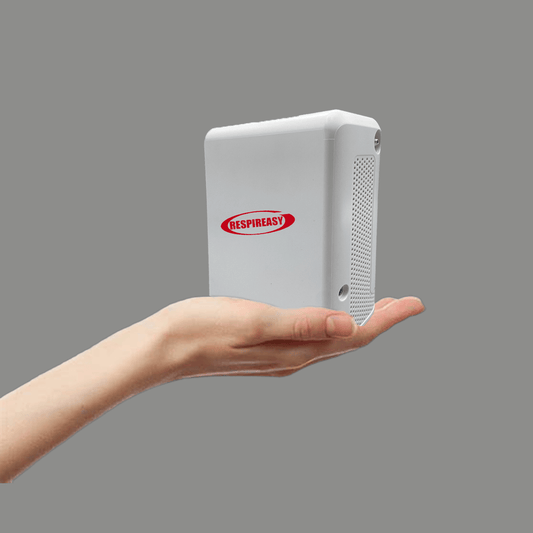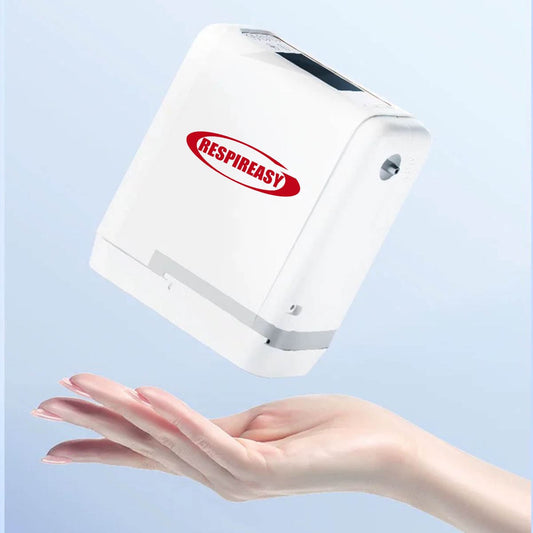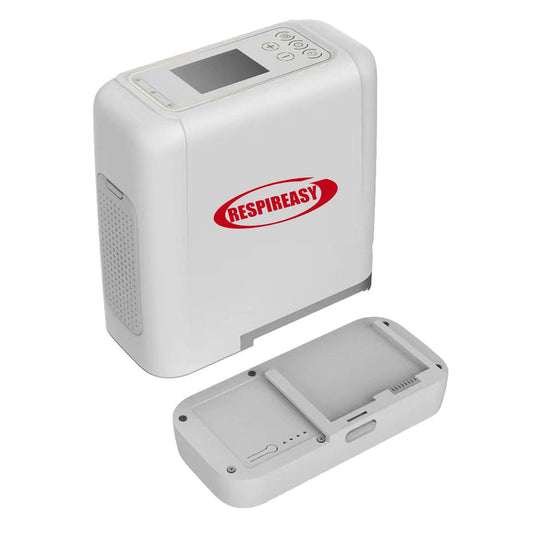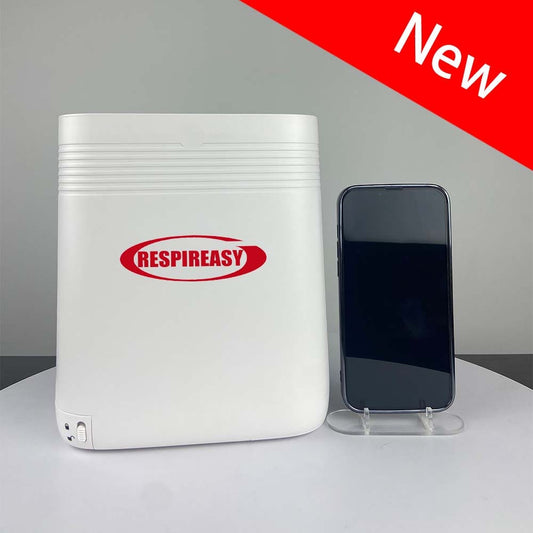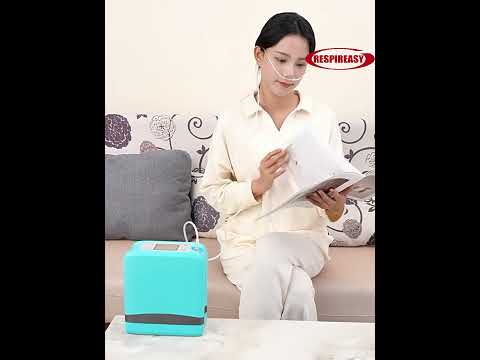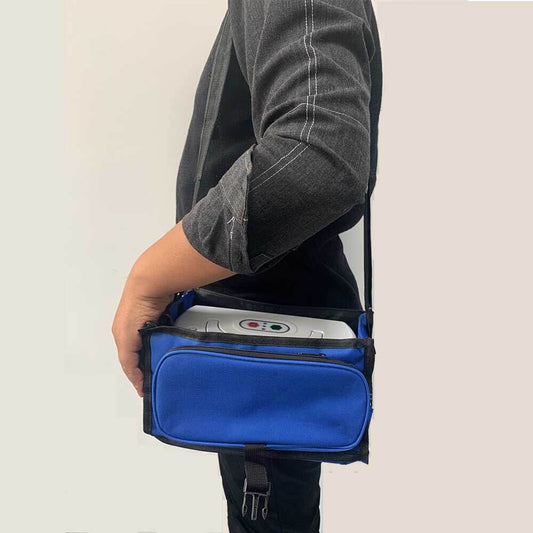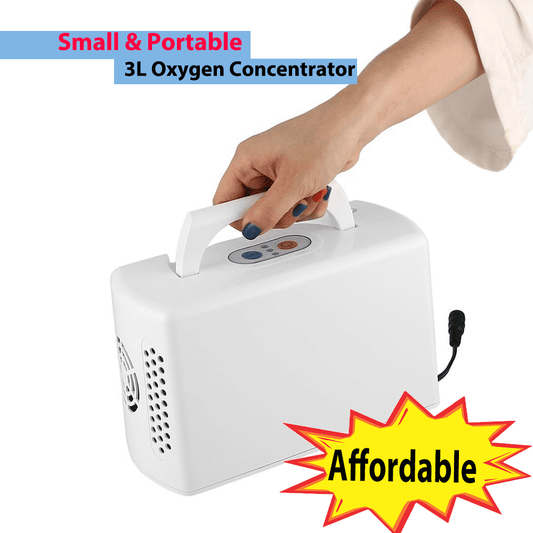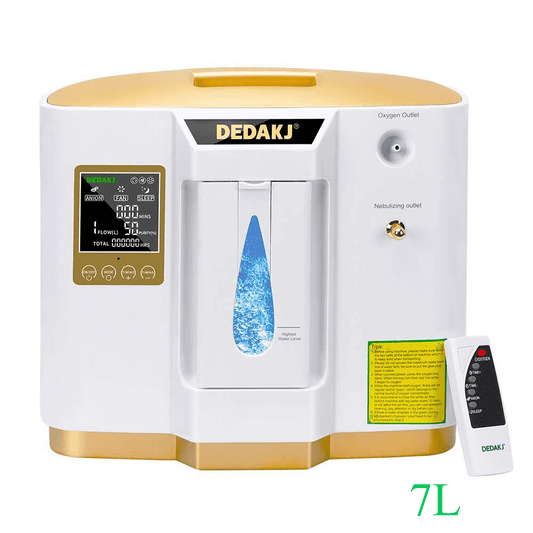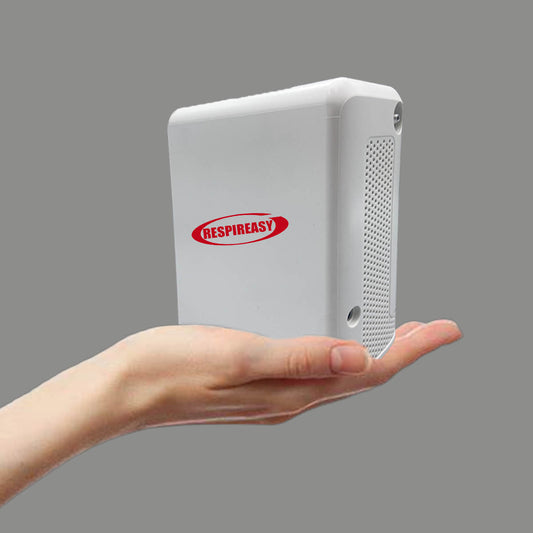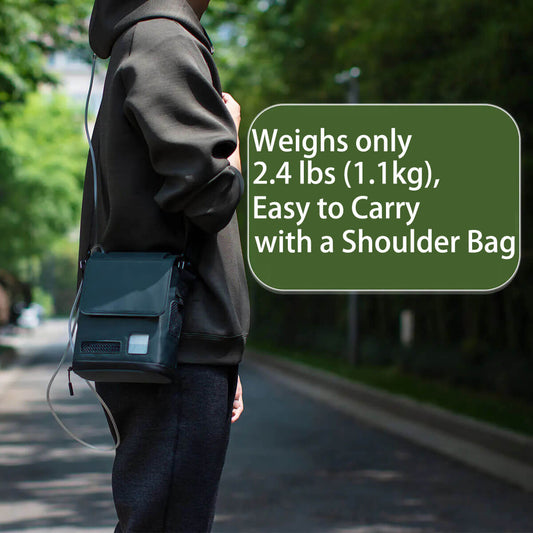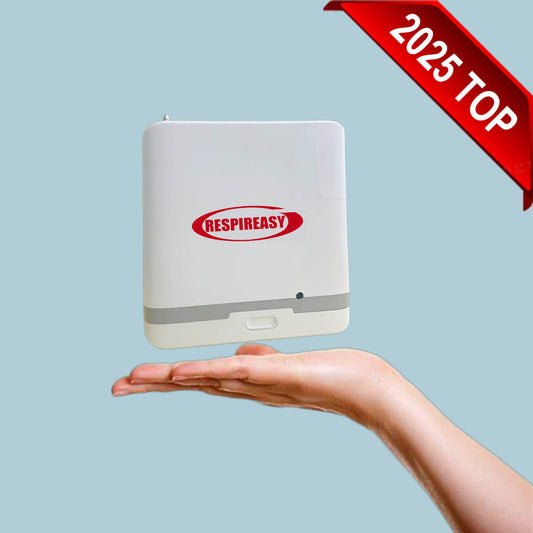8 desafíos que debe esperar este invierno si tiene EPOC
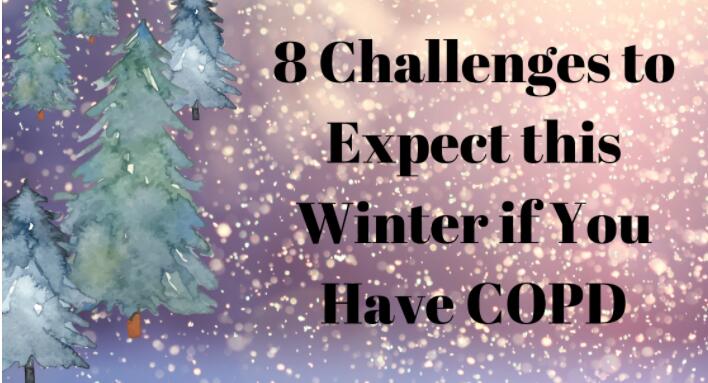
If you have COPD, then you know that all kinds of unexpected things lata affect your symptoms and make them worse. Even minor respiratory irritants, like fragrances, air pollution, and dry air, can make it more difficult to breathe.
That's why, when the seasons shift, it's important to understand how the change might affect your COPD. This is particularly true when moving from the mild fall season into harsh winter conditions.
As the cold weather sets in, you should be aware of all the potential COPD hazards that winter weather brings. Then, you will be better prepared to manage your symptoms and deal with the challenges when they come.
In this guide, we're going to walk you through all of the most common challenges COPD patients face during the winter time. We'll warn you about winter respiratory irritants, weather hazards, and other seasonal conditions that could make your symptoms worse.
We'll also show you what you can do to prepare for these problems and minimize their impact on your lungs. That way, instead of spending the winter months struggling to manage your disease, you can use the tips and tricks in this guide to overcome winter challengesybreathe much better this season.
Things You Should Know and Prepare for This Winter if You Have COPD
Extra Difficulty Breathing Winter Air
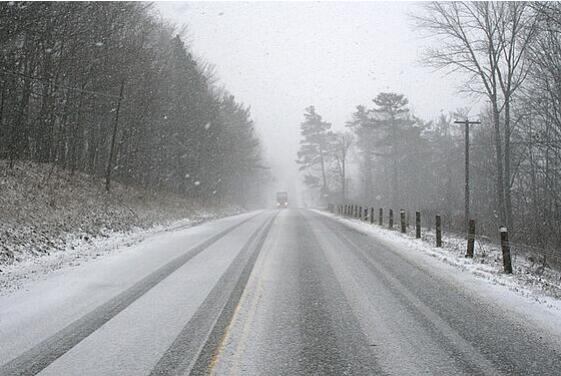
You might have noticed on your own that breathing cold, winter air can make it more difficult to breathe.
That's because winter air is usually far from the optimum temperature and humidity that your lungs and airways prefer. Cold, dry air is much harsher to breathe than warmer, humid air, and it can irritate your lungs and constrict your airways as you breathe.
When the humidity is very low, the dry air sucks the moisture out of your airways. This thickens your mucus and irritates the tissue that lines your nose and airways, triggering symptoms like coughing and shortness of breath.
The cold temperature of the air alone can also be a problem, especially when you first go outside after breathing warm indoor air. When you take a breath and suddenly bring frigid air into your lungs, it can trigger bronchospasms, which constrict your airways and make it harder to breathe.
The best way to avoid these problems is to avoid breathing the cold, dry winter air as much as you can. That means staying indoors when weather conditions are bad and using simple techniques to warm up the air that you breathe.
This is easier to do if you check your local weather forecast regularly and plan ahead for upcoming conditions. Pay special attention to the temperature and humidity, and be prepared to take extra measures to manage your symptoms on particularly harsh days.
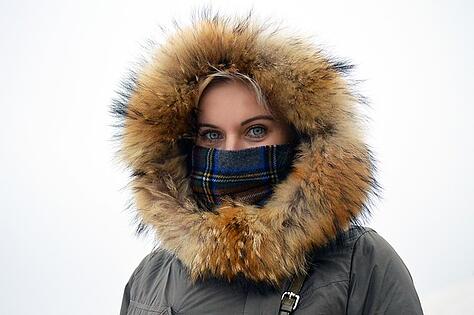
When you do have to go out in the cold, you can make the air more breathable by covering your nose and mouth with a scarf or a special cold-weather mask (called a CT mask). This will trap heat and moisture from your breath, helping to warm and humidify the harsh outside air so it is more comfortable to breathe.
Here are some tips to help you breathe better in the frigid winter air:
Danger During Cold and Flu Season
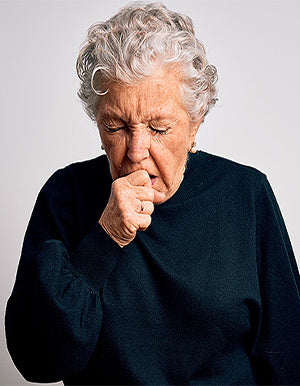
Along with winter comes cold and flu season, that dreaded time of year when contagious respiratory illnesses reach an all time high. This time of year poses a special danger to people with COPD, who are more prone to getting sick.
While a common cold might not seem like a big threat, a minor illness like a cold can turn into something much more serious if you have COPD. Any kind of respiratory illness can trigger severe COPD symptoms and lead to more serious exacerbations.
COPD exacerbations are difficult to treat and, in the worst cases, can cause life-threatening complications. Even minor COPD exacerbations can make you feel very sick and take a major toll on your life, disrupting your ability to exercise, work, and do other normal activities.
COPD exacerbations can also take a very long time to recover from, and in some cases can result in permanent lung damage that makes your symptoms permanently worse. That's why it is so important to practice good hygiene, keep your immune system healthy, and avoid contagious illnesses if you have COPD.
https://dedakjoxygenconcentrators.com/collections/home-use-oxygen-concentrator
Unfortunately, studies show that people with COPD are more than twice as likely to experience an exacerbation during the winter months. That means you need to take extra special precautions during this season to avoid getting sick.
That means doing what you can to bolster your immune system and keeping your COPD symptoms under control. It also means coming up with strategies to help you avoid germs and germ-heavy environments, especially during peak cold and flu season.
The best way to do this is to keep up-to-date with your vaccinations and be diligent about your personal hygiene. Especially when you're out in public, be cautious about what you touch and avoid transferring germs from your hands to your eyes, nose, and mouth.
Wash your hands often, avoid people who are sick, and be especially cautious in crowded places. If you use oxygen therapy, you should be extra diligent about keeping your medical equipment (like your nasal cannula) clean during the winter.
Here are some additional tips to help you prepare for cold and flu season:
- Get your yearly influenza vaccination.
- Ask your doctor if you need a pneumococcal (pneumonia) vaccine.
- Take all of your medications as directed by your doctor and take care not to miss a dose.
- Know the early signs of a COPD exacerbation and what you should do when you notice your symptoms starting to get worse (follow your COPD action plan).
- Practice proper personal hygiene at home and especially in public.
- Wash your hands often and avoid touching your face, especially in public places.
- Avoid attending crowded events during cold and flu season.
- Do your best to stay away from anyone who has a contagious illness, including avoiding houses or events where someone there is sick.
- Quit smoking to reduce your risk of respiratory illnesses and infections.
Extra Fatigue and Worse Symptoms in Cold Weather

Even if you protect your lungs from pollution and dry air this winter, the bitter cold can still bring you down. Cold temperatures alone can have a noticeable effect on COPD symptoms, and this effect can even last for several days.
Studies show that breathing cold air can hurt your lungs and reduce their ability to function by a measurable amount. It causes your airways to constrict and can even damage the tissue lining your airways, making it more difficult to breathe.
However, even just being in the cold air—not even breathing it—can reduce lung function and worsen COPD symptoms.
These effects are likely caused, at least in part, by how your body reacts to getting cold. In an effort keep your core temperature from falling, your body has to work harder and burn extra energy to stay warm.
When you're exposed to very cold temperatures, this can drain your energy levels and cause you to feel fatigued. It also requires your lungs to work harder to keep pace, which puts extra strain on your respiratory symptom and makes it more difficult to breathe.
Many studies have linked worsened COPD symptoms with cold outdoor temperatures and even cold temperatures indoors. Some studies show that cold temperatures can double COPD patients' risk for exacerbations and even increase their risk of death.
That's why you should be prepared to experience worsened COPD symptoms when the temperature drops this winter. That means keeping your rescue inhaler handy and making sure you have a warm place to go when extremely cold weather hits.
During the coldest months of the year, keep a diligent eye on your local weather forecast so a cold snap doesn't take you by surprise. When you're expecting extra chilly weather, make preparations to stay warm and avoid spending time outdoors.
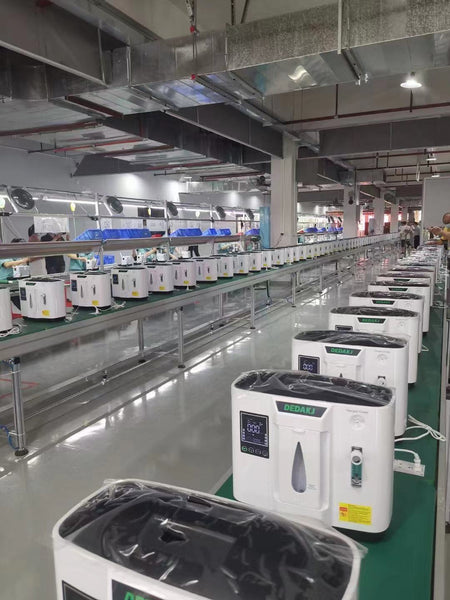
https://dedakjoxygenconcentrators.com/collections/medical-5l-10l-oxygen-concentrator
When you do go out, don't take any chances and always dress appropriately warm. Even if it adds a few minutes to your usual routine, bundling up is your best defense against the harsh winter temperatures that could worsen your COPD.
Most importantly, make sure you have a reliable heating system that can keep your home at a comfortable temperature all winter. You should also make sure you have somewhere to go if your heater breaks down or your house loses power during a storm.
Here are some tips for combating cold temperatures this winter:
- Avoid exposing yourself to cold weather and spend as little time outside as possible on especially frigid days.
- Always check the weather before you leave the house and wear appropriately warm and comfortable clothes.
- Wear layers so you can stay warm in the cold but also stay comfortable indoors by removing unnecessary layers.
- When you do go out in the cold, cover as much skin as possible; don't skimp on cold weather gear like hats, scarves, mittens, leg warmers, and earmuffs.
- Avoid clothes that are too tight—especially around the chest—because they can restrict your movement and breathing.
- Make sure to keep your house at a warm, comfortable temperature at all times during the winter.
- Consider changing your plans so that you can stay indoors during particularly cold or harsh weather. (e.g. work from home or reschedule other outings and errands)
- Make a special effort to avoid going out in cold weather when you are not feeling well or are experiencing a COPD exacerbation.
- Be prepared to use your rescue inhaler more often and bring it with you anytime you leave your home.
- Keep extra food and supplies at home just in case cold or inclement weather keeps you home-bound for an extended period of time.
- Ask a friend or family member to check up on you during cold spells and winter storms
Fewer Exercise Opportunities
If you have COPD, you shouldn't exercise outdoors when the weather is bad or the air is cold and dry. This means you will need to do the majority of your physical activity indoors during the winter months.
Exercise is one of the best ways to keep your heart and lungs healthy, which is why it's vital to keep it up all throughout the year. Even though you might be tempted to hide away and hibernate this winter, you shouldn't let the cold weather get in the way of your exercise goals.
Without outdoor sports and activities to keep you active, you might need to be more creative and deliberate with your workouts. Be prepared to rework your exercise routine and find new ways to get physical activity indoors.
For example, if you are used to walking outdoors for exercise, you could walk on a treadmill or indoor track at the gym instead. You could also take walks in a large public building in your area, such as an indoor mall.
You might also consider joining an exercise class at a local gym or fitness center. Many people find that participating in this kind of scheduled group activity makes it easier to stay motivated and stick with an exercise routine.
If you'd like, you can even work out in your own home without needing any expensive equipment. All you have to do is find a home exercise routine you like, whether it's online, on DVD, or a routine you devise yourself.
Don't ever think that staying inside means that you can't also stay active. Winter exercise opportunities are essentially endless, even though they might be tricky to find.
Here are some tips to help you get more exercise this winter:
- Join a gym where you can walk and do other exercises indoors.
- Clear some floor space in your house to practice simple indoor exercises at home.
- Find a large, public building you can go to take walks, like your local mall or community center.
- Hire a personal trainer to help you build healthy exercise skills, stay on top with your fitness goals, and learn new ways to exercise indoors.
- Get an exercise DVD to follow an exercise class or routine by yourself at home
- Join a sports class or club at your local gym or community center, such as:
- Bowling (or lawn bowling)
- Tenis
- Ciclismo
- Shuffleboard
- Golf
-
Pickleball
Join an exercise class at your gym or another fitness center, such as: - Yoga
- Tai Chi
- pilates
- Zumba
- Aerobics
- Baile
- Natación
- Ciclismo
- Water Aerobics
- Entrenamiento de fuerza
Increased Outdoor Air Pollution

Many places in the US experience an increase in outdoor air pollution during the winter. This happens for several reasons, including winter weather patterns and an increase in fossil fuels used during the colder months.
In general, the air in the winter tends to be more stagnant, which means the are fewer winds and storms to blow away the pollution that builds up in the air near cities. Winter temperature patterns also tend to push and trap polluted air closer to the ground, increasing the amount of harmful pollutants in the air you breathe.
That's why you should be ready and on the look out for poor air quality this winter. That means checking your local pollution forecast and being ready to take special measures to keep your lungs safe.
In general, you should plan to stay indoors as much as possible when air pollution is high. You should also keep your house closed up to keep outdoor pollution and other respiratory hazards from getting inside your home.
Be particularly diligent about checking the air pollution forecast before exercising or doing any kind of extended activity outdoors. You should always be ready to reschedule any plans or workouts, or move them inside, if the air quality turns out to be poor.
It's also important to note that a significant proportion of air pollution in residential areas during the winter comes from people who burn wood in in their homes. Because of this, burning less wood in your fireplace (or avoiding wood-burning altogether) is a wonderful way to protect yourself and your neighbors from unnecessary pollution this winter.
Here are some practical tips to help you avoid outdoor air pollution this winter:
- Always check your local air quality forecast before spending time outdoors.
- Always keep your doors and windows closed on high-pollution days.
- Minimize your use of fragrances and cleaning chemicals.
- Look out for no-burn warnings in your city (this indicates the air pollution risk is high) and don't burn wood on those days.
- Play your part in reducing outdoor air pollution by avoiding burning wood in and around your home altogether.
Increased Air Pollution in Your Home
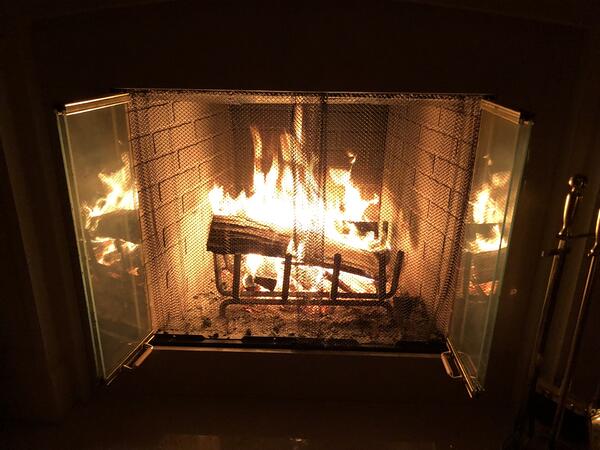
It's important to be aware that the winter season often leads to poor air quality indoors.
Common cold-weather activities like running a space heater or burning wood in the fireplace can introduce extra pollution into the air. What's worse, since it's too cold to open your windows and air out your house, that pollution tends to build up inside throughout the season.
Since most people spend at least 10 hours every day in their home—and potentially even more during the winter season—indoor air pollution is a serious hazard for people with COPD. It irritates and damages your lungs, causes your symptoms to flare up, and makes it harder to breathe when you're at home.
That's why you need to prepare to take extra steps this winter to keep the air inside your home clean.
The first step is controlling sources of indoor pollution, including fireplaces, fragrances, gas-powered appliances, and fumes from cooking and cleaning. You should also be cautious about bringing sources of volatile organic compounds (VOCs) into your home.
The second step is taking measures to get rid of irritating particles and airborne contaminates in your house. Effective measures include using high-quality air filters and air purifiers and regularly cleaning your home to get rid of dust, mold, allergens, and other respiratory irritants.
Lungs affected by COPD need fresh air in order to function properly and prevent quicker decline. While you can't always control the quality of the air around you, your home is one of the few areas in which you can make a difference in how healthy the air is to breathe.
Here are some more tips for keeping the air in your home clean this winter:
- Avoid using anything in your home that could irritate your lungs or release harmful particles or fumes into the air.
- Know the most common sources of VOCs and avoid bringing them in to your home.
- Use your stove's ventilation fan, if you have one, to vent cooking fumes out of your kitchen.
- Use simple, lung-safe cleaning products instead of common commercial products that produce noxious fumes.
- Make sure your appliances are properly installed and vented so they don't emit harmful fumes into your house.
- Get a high quality, fine-particle air filter for your HVAC ventilation system.
- Use portable HEPA air filters to clean the air in the most-used rooms in your home (e.g. the bedroom)
- Look out for opportunities to open your windows and air out your home (e.g. on mild-temperature days when outdoor air pollution is low)
- Avoid burning wood in your fireplace; if you do use your fireplace, have your chimney inspected for leaks, obstructions, and dangerous creosote build-up every year.
- Don't use a wood-burning stove or furnace to heat your home; use a less-polluting heat source like a modern gas or electric furnace instead.
Inclement Weather & Power Outages
Storms and major weather events can pose a special risk for people with severe COPD, especially during the winter. They can not only cause dangerous power outages and transportation problems, but major weather changes can also make it more difficult to breathe.
When major storm fronts go by, they often cause a drop in barometric pressure, which causes oxygen levels in the air to fall as well. While this change is small, it can still affect people with COPD since their limited lung function cannot compensate for the reduced oxygen.
This barometric pressure change can make shortness of breath worse, as can the cold winds and extreme temperatures brought by winter storms. However, power outages are probably the biggest threat that severe storms pose to people with COPD.
Patients who use supplemental oxygen are particularly at risk (especially those who use a home oxygen concentrator) because a blackout could cut off power to their oxygen source. This could be life-threatening if you need supplemental oxygen 24/7 or to manage very severe respiratory symptoms.
That's why, if you live in an area prone to inclement weather, you should be prepared for power outages this winter. Make sure you have the supplies you need to weather short-term blackouts and to treat your symptoms more aggressively if the weather makes them worse.
If you use oxygen, the most important thing to do is always make sure you have a backup oxygen source that doesn't rely on electricity, such as extra compressed air oxygen tanks. You will need to work this out with your oxygen supplier ahead of time to make sure you have enough extra oxygen to last you through an emergency.
Si tienes unportable oxygen concentrator device, you should also keep a couple of extra charged batteries ready in your house. Then you will have the extra security of always having a light, portable oxygen source in the case of an emergency.
If you plan ahead, you can also call your power company to tell them that you are medically dependent on oxygen and use a powered oxygen device as your primary oxygen source. This will allow the power company to prioritize your area when restoring power; in some cases, they may even provide a generator or special assistance to your home.
You should also keep a written list with addresses and contact information for your primary doctor, specialists, and the closest emergency room. That way, even if you don't have power or internet, you can still get medical help.
If you run out of oxygen, your local police or fire department may also be able to help by providing you with medical oxygen or an alternative power source. In the case of an immediate medical emergency, don't hesitate to call 911 or have someone drive you to the hospital immediately.
Here are some tips to help you prepare for a potential power outage:
- Develop a plan for how to keep yourself safe and healthy during a power outage or extreme weather event (and make sure to share your plan with friends and family).
- Let nearby neighbors and family members know how they can help you in case of a power outage.
- Alert your power company to the fact that you are oxygen-dependent and ask them whether or not they offer any extra services, priority, or protection for customers who rely on powered medical devices.
- Keep a written list of phone numbers you can call in case of an emergency in your home.
- Keep an extra charged cell phone battery at home in case you need to call for help.
- In the case of an extended power outage where you are unable to keep your home warm, you can always go to a heated public building.
- In case it's not safe stay in your home, make preparations ahead of time to stay with friends or family. Alternatively, you could stay at a nearby hotel that still has power and heat.
- In an emergency, never hesitate to ask for help when you need it.
- If you use supplemental oxygen, always have a back-up plan:
- Always keep a backup oxygen supply in your home.
- If you use a home oxygen concentrator, ask your oxygen supply company to provide you with extra oxygen tanks in case of a power outage.
- Keep an extra, charged set of backup batteries for your oxygen concentrator at home.
- Remember that you can use your vehicle to power a portable oxygen concentrator if you need to.
- Ask your doctor if it is safe for you to reduce your oxygen flow to conserve oxygen during an emergency (and what flow rate you can reduce it to).
- Know whether your local fire or police department provides emergency oxygen and how to contact them if you are worried about running out (If you have a medical emergency, call 911 immediately).
- If you have the means, consider getting a source of backup power like a generator or an un-interruptible power supply.
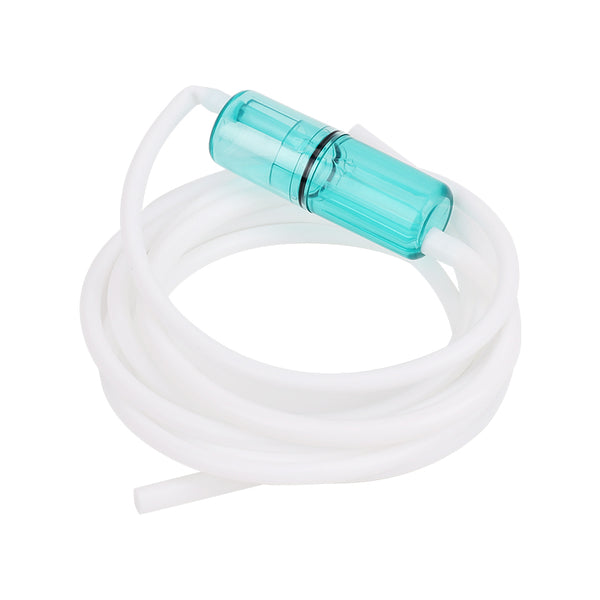
A common problem during the winter for COPD patients who use oxygen is a dry mouth, nose, and throat. This is a common symptom of oxygen therapy, but it's made worse by the harsh, dry winter air.
One way to combat the dryness is to ask your doctor for a humidifier bottle to use with your oxygen device. It humidifies the air from the oxygen source by bubbling it through distilled water, reducing how much it dries out your mouth and airways when you breathe.
Another problem many oxygen patients face is that their plastic tubing gets cold and stiff in chilly air. As the oxygen flows through the cold tubing, it gets chilled as well; by the time the air makes it to your nose, it can be harsh and uncomfortable to breathe.
That's why you should prepare to use special techniques to keep your oxygen tubing warm this winter. For example, you can get a soft cover for your tubing, which can be an effective insulator against the cold for short periods of time.
You should also look for ways to keep your oxygen tubing closer to your body so your own body's heat can keep it warm. You can do this simply by running the tubing under your coat, or by using clips and other methods to secure the tubing under your clothes.
The most important thing is to insulate your tubing enough that it doesn't cool down significantly during short jaunts in the cold. You may need to experiment with a few different techniques until you find a method that works and is comfortable for you.
Here are some tips for more comfortable oxygen therapy this winter:
- Run your oxygen tubing underneath your jacket or coat to keep it warm.
- Wear a scarf around your neck and/or face to insulate the uppermost part of your nasal cannula from the cold.
- Wrap your oxygen tubing with a fabric cover or tape to insulate it from the cold air.
- Check your tubing often for cracks, which are much more likely in cold weather when your tubing gets brittle and stiff.
- Consider using a nasal cannula made of a softer plastic that won't get as stiff in the cold.
- If you use a portable oxygen concentrator, be aware that cold weather can cause your battery to run out of power more quickly.
- Always store your oxygen tanks and/or concentrator indoors at room temperature in a place that is well insulated from the cold.
Conclusión
The winter months can be tough to get through when you live with a chronic respiratory disease like COPD. However, with the right knowledge and preparation, you can keep yourself comfortable and healthy this winter.
By planning ahead for winter hazards, you can better protect your lungs and keep your symptoms under control. You can also develop strategies to avoid getting sick and reduce your chances of experiencing a COPD exacerbation.
It's much easier to plan ahead if you know what kinds of problems and hazards to expect. Instead of letting winter difficulties get you down, you can be proactive and do what you can to minimize those challenges instead.
If you do this, you will set yourself up for a much healthier, happier and safer winter season. When the snow melts away and the spring finally comes, you'll thank yourself for the efforts you made to keep your lungs safe and prevent your COPD from getting worse.
Searching: haga clic aquí
Topics: Tips and Hacks, Oxygen Therapy, COPD Treatment, Medical Oxygen Concentrators, O2 Generator




























